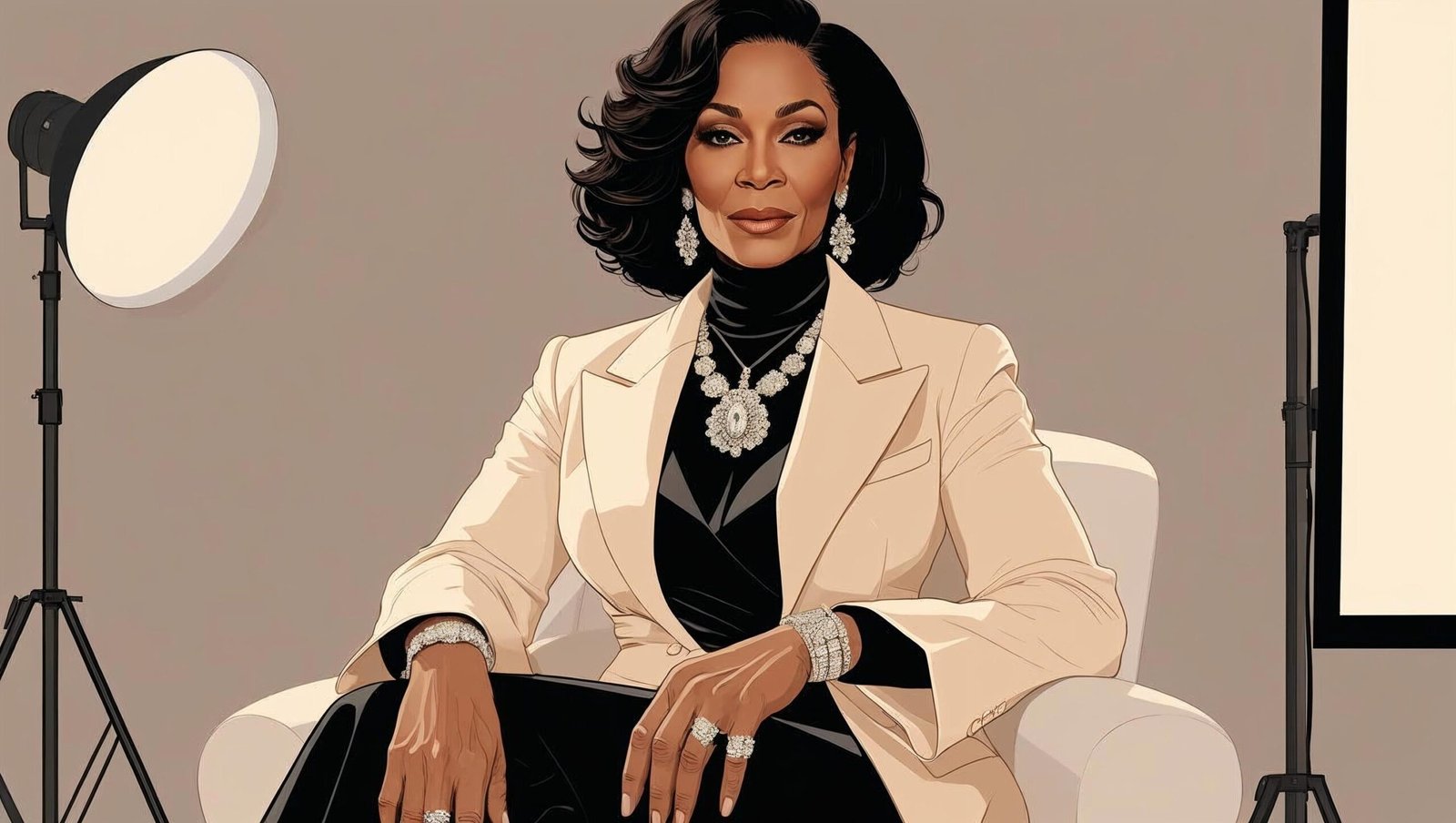Introduction: Why Matriarch by Tina Knowles and Kevin Carr O Leary Matters
The memoir Matriarch is a resounding declaration of maternal resilience, cultural legacy, and the often-unseen power behind the most formidable families. From its first page, Matriarch asserts itself not as a typical celebrity memoir, but as a profound spiritual journey.
Tina Knowles, mother of iconic daughters Beyoncé and Solange, reveals her soul in Matriarch, offering readers stories of trauma, love, evolution, and hope. Co-authored by Kevin Carr O Leary, the book transcends biography and enters the terrain of transformation.

1. The Origins of a Matriarch: Strength Built from Scarcity
At its foundation, Matriarch excavates Tina Knowles’ humble beginnings. Her childhood amidst segregation, economic instability, and systemic oppression forms the backdrop of her emotional grit.
Instead of seeking sympathy, Matriarch offers inspiration. The memoir teaches us that pain and perseverance can coexist—and that resilience often blooms in the shadow of scarcity.
2. Lessons on Motherhood That Transcend Biology
Matriarch isn’t just a reflection on parenting; it’s a deconstruction of it. Tina opens up about her parenting missteps and triumphs with raw vulnerability. Her portrayal of motherhood is refreshingly honest, touching on themes of control, surrender, and growth.
Motherhood in Matriarch is dynamic. It evolves with age, wisdom, and spiritual insight. Tina challenges societal norms about maternal perfection and embraces the beauty of imperfection.
3. Kevin Carr O Leary’s Role: Editor with Empathy
While Matriarch is deeply personal, co-author Kevin Carr O Leary ensures that its structure is fluid and coherent. He maintains the authenticity of Tina’s voice while guiding the narrative arc with care and intention.
The result is a memoir that flows gracefully—from chaos to calm, from silence to strength.
4. Generational Pain and Healing
One of the most powerful elements of Matriarch is its exploration of generational trauma. Tina reflects on her parents’ emotional distance, societal limitations, and the psychological inheritance passed through silence.
Through Matriarch, she breaks these cycles. The book becomes both confession and catharsis—a tool for healing and a mirror for readers dealing with ancestral wounds.
5. Beyond the Knowles Name: Redefining the Matriarch
While the title might attract fans of Beyoncé, Matriarch isn’t about fame—it’s about foundation. Tina reclaims the word “matriarch” as something sacred, something earned.
In Matriarch, being a matriarch means leading with grace, making sacrifices, and being the emotional backbone of a lineage. It is a weighty title, not one of glamour, but of grit and quiet power.
6. The Spiritual Undercurrents
Faith weaves itself delicately through Matriarch. Tina speaks candidly about moments when her belief in a higher power was all she had. The book is deeply spiritual—not religious—but rich with references to divine timing, intuition, and soul wisdom.
This spiritual resonance adds depth to Matriarch, making it not just a memoir, but a meditation on life’s unseen forces.

7. Black Identity and Cultural Commentary
Tina’s reflections in Matriarch on hair culture, racial bias, and assimilation are enlightening. Her journey through beauty salons and white-dominated industries is both empowering and heartbreaking.
Matriarch serves as cultural commentary on the sacrifices Black women make to fit in, stand out, and survive. Through subtle yet searing stories, Tina reclaims authenticity over approval.
8. The Strength of Vulnerability
Perhaps the greatest revelation in Matriarch is the redefinition of strength. Tina opens up about failed marriages, body image struggles, and loneliness. Her willingness to be seen in her entirety gives Matriarch its emotional potency.
There is no performative strength here—just the raw kind that comes from breaking and rebuilding.
9. Matriarchal Power in a Post-Feminist Age
In a world where youth, independence, and hyper-individualism are praised, Matriarch argues for the relevance of wisdom, rootedness, and caretaking. Tina doesn’t ask for validation; she shows that legacy is her response to erasure.
Matriarch reminds us that power isn’t loud—it’s lasting. And matriarchs don’t fade with time; they illuminate generations.
The Evolution of a Daughter and a Woman
Tina Knowles’ story is a testament to the layered identities women often carry—daughter, sister, wife, mother, entrepreneur, and guide. Her reflections trace her own coming-of-age as the youngest of several siblings, shaped by the high expectations of a strict father and the quiet endurance of a reserved mother.
Growing up in Galveston, Texas, during an era of racial division and minimal opportunity, she learned early on that voice and silence both carry weight. Her anecdotes from school years reflect an early resistance to conformity, which would later become the foundation of her values in raising her own children.
More than any fame her daughters may have achieved, it’s Tina’s insistence on instilling independence, dignity, and spiritual grounding that marks her greatest triumph. She reveals how her mother never complained—something she admired and feared becoming. It was only after years of repeating similar patterns that she consciously broke away from inherited expectations and began to define life on her own terms.
On Self-Worth and the Long Road to Confidence
One of the most moving portions of the memoir explores the inner battle with self-worth. Despite public success and external beauty, Tina reveals long-standing insecurities related to appearance, class, and validation. She recounts moments of shrinking herself to accommodate others and the guilt that came with choosing her happiness over familial obligations.
Yet the arc bends toward healing. She finds freedom in naming her wounds, in dismantling perfectionism, and in embracing vulnerability. She shares deeply about her divorce and the loneliness that followed—a silence that wasn’t publicized but lived through with prayer, therapy, and self-reflection.
For many readers, her honesty around aging, body image, and romantic rejection may be the most relatable chapters of the entire narrative. It dismantles the idea that achievement makes one immune to doubt. Her journey reminds readers that healing is not a destination, but a practice.
The Role of Creativity as Emotional Salvation
Tina’s journey as a stylist and designer wasn’t just about fashion—it was about identity reclamation. Through hair, clothing, and visual expression, she empowered women in her community to see themselves as beautiful and worthy.
Her career wasn’t linear. She recalls failed business ventures, long work hours, and the challenge of juggling entrepreneurship with parenting. What stands out is how creativity became both therapy and theology. Whether designing for Destiny’s Child or working quietly in her salon, she found God in the details—in the weave of fabric, in the trust of her clients, in the daily act of service.
She discusses how styling was never superficial for her. It was a way of honouring identity and giving form to emotion. She gave women a canvas upon which they could write their dignity.

Motherhood Across Generations
The relationship with her own mother is complex and filled with dualities—respect and distance, admiration and silence. Her mother worked tirelessly, never asked for praise, and rarely shared her emotions. Tina reflects on the impact of growing up with affection withheld and feelings repressed.
This upbringing influenced her own parenting style. At first, she was overly strict, trying to maintain control in a chaotic world. Over time, she learned to choose connection over control. With Beyoncé and Solange, she admits to moments of overcorrection, as well as profound pride in their artistic autonomy.
She shares how her daughters taught her as much as she taught them. The most tender moments are not about achievements or awards, but about small acts—cooking together, apologising after arguments, supporting each other through heartbreaks.
The Cost of Being the Strong One
So many women are cast in the role of emotional anchor—the person who “holds it all together.” Tina Knowles speaks to the exhaustion of always being strong. From managing public scrutiny to being the go-to problem solver for family and friends, she describes the burden of perpetual reliability.
She opens up about what it feels like to suppress pain so others don’t have to feel it. Over the years, she realised that being unbreakable isn’t the goal. Being human is. Admitting she’s not always okay became a revolutionary act. Through stories of tears cried in hotel rooms and prayers whispered in silence, she gives permission for women everywhere to release the need for invincibility.
Romance, Renewal, and Rebirth
After the end of her decades-long marriage, Tina found love again—but not without resistance. She talks candidly about second-guessing herself, about fearing that she was too old, too wounded, too set in her ways.
Her reflections on romantic renewal are not filled with clichés. Instead, she talks about the power of intentional companionship, shared spiritual values, and emotional maturity. She also acknowledges the difficulty of blending families, redefining loyalty, and letting go of past hurts to embrace new joy.
Her love story in later life becomes a metaphor for resilience. It’s a quiet yet powerful reminder that it’s never too late for new beginnings, and that past experiences do not define one’s capacity for happiness.
Community, Activism, and Responsibility
Throughout her life, Tina has remained deeply embedded in her community. Long before she became a household name, she hosted youth programs, offered free styling to low-income girls, and created safe spaces for Black expression through fashion.
Her activism may not always be front-page news, but its effects are long-lasting. She speaks about her responsibility to uplift other women, particularly those who are silenced or overlooked. She advocates for mentorship, financial independence, and emotional education as tools of liberation.
Through this work, she has fostered not just influence—but impact. Her legacy isn’t confined to entertainment. It echoes in the lives of the women she’s empowered behind the scenes.
The Inner Child and the Power of Naming Pain
Tina dives into inner child work with surprising depth. She shares how, for years, she carried wounds from abandonment, rejection, and unspoken grief. Only when she began to speak about her fears out loud did they begin to lose power.
Therapy, journaling, prayer, and introspection played a role in her healing. She learned to trace adult triggers back to childhood events. She learned to sit with discomfort instead of dismissing it. And most importantly, she learned to forgive herself.
The narrative here is not linear—it loops, circles, and spirals, much like the healing journey itself. But the takeaway is clear: you cannot fix what you will not name.

The Balance Between Privacy and Transparency
One of the most delicate challenges Tina faced was how much of her life to share. In a world obsessed with exposure, she often chose dignity over drama. But in this memoir, she opens the curtains just enough.
She discusses how public life often distorts truth. Gossip, criticism, and misinterpretations can erode even the most grounded spirits. She speaks of developing thick skin while keeping her heart soft.
The tension between public scrutiny and personal truth is something many readers—especially women—will understand. It’s not just about fame. It’s about being misunderstood, reduced, or mislabeled. Tina shows that transparency doesn’t mean exposure—it means honesty.
Learning to Rest Without Guilt
Burnout is a recurring theme, not in clinical terms, but in emotional undertones. Tina reflects on years of overwork, sleepless nights, and emotional labor that often went unseen and unacknowledged.
Only in recent years did she give herself permission to rest. She speaks about learning to say “no” without explanation, about redefining productivity, and about the radical act of simply being. Her embrace of rest is not laziness—it is self-respect.
This is particularly important for readers raised to equate worth with output. She reminds us that we are not machines, and that presence matters more than perfection.
Reclaiming Joy Without Shame
Joy, for Tina, was not always easy. She talks about feeling guilty for laughing too loudly, dressing too boldly, or taking up space in rooms not designed for her. These small, internalised limitations accumulated into a cage.
But through growth, faith, and community, she began to reclaim delight. She discovered that dancing, painting, and taking long walks were not indulgences—they were lifelines. And in rediscovering joy, she reintroduced herself to the world.
Her message to others: Don’t apologise for feeling alive. Don’t tone yourself down to make others comfortable. There is no shame in happiness that is hard-earned.
Wisdom Passed Down, and Carried Forward
In her final reflections, Tina offers advice not as commandments, but as offerings. She speaks to younger generations of women—those trying to balance ambition with belonging, independence with intimacy, and power with peace.
She encourages women to define themselves by their values, not by societal timelines. She urges readers to create families of spirit when biological families fall short. And most of all, she calls for compassion—for oneself, and for others walking unseen battles.
Her voice throughout is not one of ego, but of lived experience. Her final chapters carry the tone of a mother speaking from a kitchen table, offering lessons you didn’t know you needed.
A Living Legacy
This book does not end with a final note, but with an invitation. It asks readers to reflect on the people who shaped them, the roles they play, and the stories they carry. It is not only a memoir—it is a prompt for introspection.
Tina Knowles’ life is not offered as a blueprint, but as proof that transformation is possible—at any age, in any circumstance. Her life holds space for pain, and simultaneously overflows with purpose.
In a world constantly pushing forward, this book encourages readers to look inward and backward—because sometimes, the future is shaped most by those who dared to love despite the odds.

Conclusion: Why Matriarch Will Stay With You
Matriarch is more than a book. It’s an emotional companion. Tina Knowles lays herself bare, offering lessons not just on motherhood, but on womanhood, faith, resilience, and rebirth.
This memoir isn’t about success—it’s about substance. Not about spotlight—but soul. For readers looking to reconnect with their roots, reframe pain, and rediscover their strength, Matriarch delivers.
Visit shubhanshuinsights.com for more powerful, soul-deep reviews that resonate far beyond the page.
Frequently Asked Questions (FAQs)
Q1. What is Matriarch by Tina Knowles and Kevin Carr O Leary about?
A1. Matriarch is a memoir chronicling Tina Knowles’ journey as a mother, spiritual leader, and cultural symbol. It explores themes of resilience, identity, motherhood, and legacy.
Q2. Is Matriarch focused on Beyoncé’s fame?
A2. No. While Beyoncé and Solange are mentioned, the memoir focuses on Tina’s personal evolution and deeper family history.
Q3. Who should read Matriarch?
A3. Anyone seeking stories about healing, identity, motherhood, spirituality, or overcoming emotional trauma will find Matriarch enriching.
Q4. Does the book include spiritual themes?
A4. Yes. Matriarch integrates spirituality through themes of intuition, divine timing, and emotional resilience without being religious.
Q5. Where can I find more such detailed reviews?
A5. Visit shubhanshuinsights.com for in-depth analysis of life-changing non-fiction books.
Sample Comments Section for Engagement
🔥 “Matriarch gave me goosebumps. This review hit all the emotional notes.” – Priya R.
💬 “Tina’s strength radiates from the pages. Beautiful summary of a beautiful soul.” – Jordan B.
🌱 “You don’t have to be a parent to feel transformed by Matriarch. So glad I found this review.” – Aastha M.
📖 “Thank you for breaking this down with such care. I’m buying Matriarch right now.” – Stephen D.